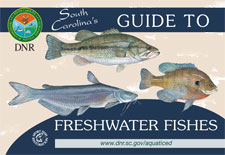Freshwater Fish - Species
Species Specific Regulations
Channel catfish
Freshwater Fishing License required.
Channel catfish (Ictalurus punctatus)
Description: (Anatomy of a Fish)
The channel catfish has a slender body that is pale blue to olive on the back and sides with a white belly. Dark spots are usually present on the back and sides, but these tend to fade in larger adults. The caudal fin is deeply forked.
Range: Statewide
Average Length: 16 inches
Average Size: 1-1 ½ pounds
South Carolina State Record: 58 pounds (1964) (Current World Record)
Life Expectancy: Approximately 24 years
Preferred Habitat
The channel catfish inhabits a variety of habitat types including small to large creeks, rivers, reservoirs and ponds over a range of substrates.
Food Habits
- Fish, crayfish, mollusks, immature mayflies and caddisflies, aquatic vegetation.
Spawning
- Spawning occurs from May to July when the water temperature is approximately 70-80° F.
- A gelatinous mass of eggs is deposited in a nest constructed by the male below undercut stream banks, logs or other secluded areas.
- The nest is guarded by the male for some time after the eggs hatch.
Miscellaneous
The channel catfish is the principal species in freshwater aquaculture in the Southeast. State and federal fishery agencies have stocked channel catfish extensively through South Carolina with special emphasis on selected farm ponds.
Commonly Mistaken Species
One species of fish that is commonly mistaken for this species is the blue catfish. Both the blue and channel catfish have deeply forked tails and similarly shaped bodies, but differ in that channels have black spots and a shorter, rounder anal fin.
Literature Cited
Rohde, Fred C, Arndt, Rudolf G., Foltz, Jeffery W., Quattro, Joseph M. 2009. Freshwater Fishes of South Carolina. University of South Carolina Press, Columbia, South Carolina.
Wildlife and Freshwater Fisheries Division. 2009. South Carolina Guide to Freshwater Fishes.
Fish Illustration by Duane Raver.


